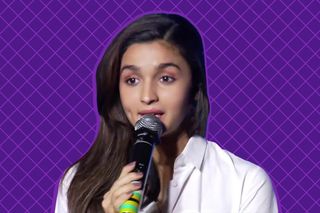
Alia Bhatt Misses the Point on the Gender Wage Gap
We need more high-profile women to parse gender parity arguments more responsibly.

The gender wage gap discussion sweeping the world has started to make ripples in Bollywood, but on Wednesday, there came setback, when Alia Bhatt rubbished the idea that female stars should always receive pay equal to their male counterparts.
“Investing money in a film is directly co-related to the people you are bringing to the theatre,” she said during an interview with DNA. “I’m not delusional that the same number of viewers who go to watch Varun’s movies will come to see my work. He has a wider reach than me. That’s why I can’t expect that the same amount of money, which is invested in his solo-starrers, is invested in mine, too.”
I like Alia Bhatt. I think she’s a talented actress and a good role model for young women, amid a host of less healthy and less intelligent ‘influencers.’ Which is why her statements on equal pay in Bollywood are so disheartening for me.
Movie industries around the world are geared toward cranking out male-centric movies. Bollywood is no exception; in the two year period between 2015 and 2017, only 11.9% of all Hindi movies released had plots that turned on a central female character. Consequently, male-dominated entertainment is what viewers have come to expect and want to pay for — if only because they have few other options.
The lack of women-driven narratives has been a primary point of clamor in the current #TimesUp era. Women-led entertainment is considered niche (a bizarre idea, considering women make up half of the population) and receives less funding. The production and marketing budgets for such films are smaller. Therefore, so are their audiences. The expectation that women should net as many achievements — while backed by fewer resources — in order to be rewarded with basic parity, is the exact same systemic unfairness that has dogged them in every field of work.
Take women’s sports, for example. The primary argument against equal prize money for men’s and women’s competitions is that women’s sports draw fewer viewers, and thereby, are less financially rewarding. Men’s sports draw more viewers because their events feature more competitive and higher quality play. We’ll leave, for the moment, the fact that Serena William’s popularity, skill and achievement caused the women’s 2015 US Open to sell out faster than the men’s. And instead just accept that with less investment and less incentive, women’s sport will remain lower quality (if you buy that argument) and less competitive.
Or the culinary world, in which only 7% of women are head chefs, and only 33% of restaurants are majority-owned by women.
“We keep hearing the same thing over and over again [from female chefs]. It’s hard to get money, it’s hard to get media attention and it’s even harder to be heard and given equal respect compared to their male counterparts,” Mitchell Davis, the executive vice president of the James Beard Foundation, told Observer.
With less investment and less incentive, women-led anything will continue to be considered ‘niche’ and not attract as large a return. It’s a vicious circle that we — men and women, employer and employee, viewer and performer — have been conditioned to buy into, and conditioned to perpetuate.
“The minute you start believing that you deserve this, then there’s a problem,” Bhatt said in the interview. “If you deserve something, you’ll get it. We shouldn’t try and control things.”
Bhatt is entitled to her opinion; no doubt this stems from a zen, hard-working, take-nothing-for-granted place, which plays well in an industry known for its nepotism. But in a society in which patriarchal values run deep — values that hold women don’t deserve equal pay, or an equal voice — this turn of phrase is disappointing. And in an industry in which only two actresses appear in the top 10 highest paid actors, it rings simply untrue.
Liesl Goecker is The Swaddle's managing editor.
Related


Stop Sharing the Video of a Mumbai Teen Jumping to Her Death
